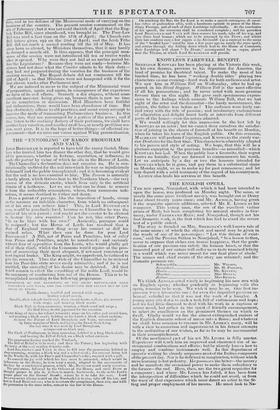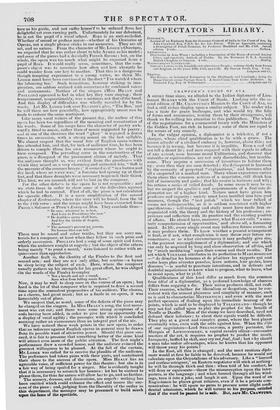THE ENGLISH OPERA.
THE new opera, Nouljahad, with which it had been intended to open the house, was produced on Monday night. The same, or nearly the same piece (without music), was brought out at Drury Lane about twenty years since; and Mr. ARNOLD, having given it the requisite operatic additions, selected Mr. E. LODER as his composer. This young man, the son of the excellent violino prime of Bath, has been completing his musical studies in Ger- many, under FERDINAND RIES; and Nourf (Mad, though not his first dramatic work, is the first which has had to stand the severe test of a public ordeal. The story is founded on Mrs. SHERIDAN'S well-known tale of the same name; of which the object and moral may be given in the words of one of its personages : " Let this dream of exist- ence," said the Persian Sultan to Nourjahad, " be a lesson to thee, never to suppose that riches can insure happiness, that the grati- fication of our passions can satisfy the human heart, or that the immortal part of our nature will suffer us to taste unmixed felicity in a world which was never meant for our final place of abode." The names and chief events of the story are retained; and the dramatis personea are
Schemzr•ddi
ll'nnrjaIraft
flusein Mundane Zuliaur
14Ir. WILSON', Mr. H. Prumrs, Mr. KEELFY, Miss HEALS", Miss Rostra.
We think ARNOLD acted wisely in beginning his new mra with an English opera; whether prudently in beginning with this opera, remains to be seen. We wish it may be so. Our first im- pression v-as a favourable one ; for even the imperfect previous re- hcaraal satisfied us that it was not the work of a bungler. A young man sits down to such a task full of enthusiasm and hope; 'and we feel little disposed to deal with his work in a captious or severe mood, but rather in the spirit of friendly encouragement, to select its excellences as the prominent themes on which to dwell. Gladly would we fan the almost extinguished embers of the English dramatic school of music into a flame; and whatever we shall have occasion to censure in Mr. LODER'S essay, will be with a view to correction and improvement in his future attempts to the realization of our wishes, as far as he may be instrumental in their accomplishment. Of the mechanical [art of his art Mr. LODER is fully master. Experience will teach him an improved and chastened use of in- strumental combinations and effects; but he already knows how to employ and combine instruments well. In this department of operatic writing he already surpasses most of the Italian composers ofthe present day. Nor is he deficient in imagination, without which mere learning is but pedantry. Ile possesses the latter—the means; and he manifests the occasional power to make them subsidiary to the former—the end. Here, then, are the two great requisites for a composer ; and where Mr. LODER has failed, it has been from the interposition of difficulties which he could not avoid, or from the want of that experience which must direct an artist to the fit- ting and proper employment of his means. He must look to Na- ture as his guide, and not suffer himself to be seduced from her delightful yet ever-varying path. Unfortunately for our debutant, he is not the pupil of a vocal school. Elsa is an anti-melodist. Whether of sacred or profane music—whether of his Oratorios or Operas, not a single phrase sticks in our memories. They are all art, and no nature. From the character of Mr. LODER'S Overture, we expected that he was rather about to take A UBER as his model ; and some of the pieces had a decidedly French flavour; but, on the whole, the opera was too much what might be expected from a pupil of RIES. It would really seem, sometimes, that the com- poser's object was to ascertain how often and how abruptly he -could wander from one key to another. That this is a dangerous though tempting experiment to a young writer, we think Mr. LODER must have been convinced in the duet " I've watch'd where the labouring bee." Such transitions, however striking in ima- gination, are seldom realized with correctness by combined voices and instruments. Neither of the singers. (Miss HEALY and PHILLIPS) appeared to feel in what key they were singing ; their temperament, unquestionably, was sometimes not that of the band. And this display of difficulties was wholly uncalled for by the words. Let Mr. LODER look over ELI.lorr's glee, "The Bee," and he will there see how gracefully, how appropriately music can be made to enforce the same sentiment.
Like many vocal writers of the present day, the author of this
opera has been too regardless of the meaning and accentuation of his words. Some of his songs have the character of poetry awk- wardly fitted to music, rather than of music suggested by poetry ; aed in one of the choruses the word " glory " is repeated a dozen times in succession, with a strong accent on the last syllable. We almost suspect that the usual fate of English opera-writers has attended him, and that, for lack of sufficient time, he has been driven to compile (from his own resources) where he ought to have composed. The pervading error in the construction of the piece, is a disregard of the paramount claims of melody. That the audience thought so, was evident from the greediness with which they seized on a very charming and animated trio, " Soft is the murmur of the summer breeze :" it seemed as if " in a barren and dry land, where no water was," a fountain had sprung up at their feet, and that three draughts were necessary toquench their thirst. This hint, we are assured, will not be lost on the composer.
For the other defects in the opera he is not responsible : and
we state them in order to show some of the difficulties against which he had to contend. First of all, the piece is not calculated for operatic effect. It is a mere amplification of the second chapter of Ecclesiastes, where the story will be found, from the 3d to the I lth verse : and the songs might have been extracted from PRIOR'S Solomon or POPE'S Essay on Man. They conclude thus- " Be sure, whatever is, is best,
And have to Providence the rest."
" He deathless agony shall bear, And live the victim of despair, Alone."
" The moment's present joy pursue,
• No human bliss can last."
'These may be sound and sober truths, but they are sorry ma- terials for a composer, at least when they follow in such prim and orderly succession. PHILLIPS had a sor"r of some spirit and force, which the audience caught at eagerly ; but the object of the others being merely "to point a moral,' were listened to rather with ac- quiescence than approbation. Another fault is, the identity of the Finales to the first and second acts : and they are not only alike, but sombre—a hymn to sleep being the subject of each. Here, where the composer usually gathers up his strength for his great effort, he was obliged ,(in the words of the Finale) to employ " Not a breath and not a sound, Save what from lulling music flows."
Now, it may be well to sleep once in tho course of an opera ; but heed is the lot of that composer who is required to draw a second time upon the somnolent propensities of his auditors. The chorus, as a chorus, had great merit; but as a finale in an opera, it was lamentably out of place.
We suspect that, as usual, some of the defects of the piece may be charged on the singers. In Miss IIEALY'S song, the first move- ment was cut out; and there were some strong symptoms of a coda having been added, in order to give her an opportunity for a display of vocal agility ; the passages with which it concluded seeming rather an excrescence than an integral part of the air. We have noticed these weak points in the new opera, in order that no inference against English operas in general may be drawn from its possible want of attractive power. Should this piece suc- ceed, it is fair to presume that something better of the same kind will attract even more of the public attention. The first night's performance drew a crowded house, and the audience evinced the greatest willingness to be pleased. At the fall of the curtain, Mr. LODER was called for to receive the plaudits of the audience. The performers had taken pains with their parts, and contributed their share to the success of the opera. Miss HEALY has an agreeable voice, of sufficient power for this theatre: but she is in a fair way of being spoiled for a singer. She is evidently taught that it is necesssary to astonish her hearers : let her be content to please them, for thus fur nature will allow her to go, and no further.
The scenery, dresses, and decorations, are superb: nothing has been omitted which could enhance the effect and insure the suc- cess of the piece : and, judging from the liberality of the outlay in this -department, the manager may be presumed to build much upon the fame of the spectacle.





















 Previous page
Previous page